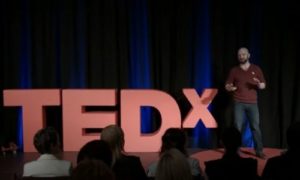Nobody is perfect; we all have ways in which we want and need to grow, or to improve our strengths. However, these desires aren’t always at the forefront of our brains. Sometimes we don’t even recognize the areas where growth is most needed until something drastic forces us to look at them.
We often realize where our weaknesses are in moments of vulnerability. For example, after a person we care about leaves, or when we get difficult feedback, or when a project we are working on falls apart.
When these moments hit, we may suddenly realize that something about ourselves needs to shift, that our strengths need improving.
The breakdown or crisis that leads to this moment of clarity is usually so deep and powerful that it’s impossible to ignore. Thus, it compels our system into action towards growth.
So, we set off on our personal improvement journey.
And it works at least for a while . . .
The temptation to overuse new strengths
Maybe we want to develop more patience. Maybe we want to be less judgmental. Whatever it is, we have a specific thing in mind that we want to improve, one of our weaknesses that we want to become our strengths.
It starts as an altruistic spiritual pursuit, and then as we become more aware of how to change it, we launch wholeheartedly into the process.
Once out on the other side–once we’ve done the work to develop this skill, ability, capacity, or trait–something interesting happens. We develop a sense of pride in our new power. Our change feels like a hard-won victory and as a result, we can begin to overuse this new way of being.
The signs of this happening are often hard to notice. They are much more subtle than our original wake up call. But it’s important to be able to recognize this in ourselves, so we don’t let the pendulum swing too far in the other direction and thus begin to create a new set of problems when we change.
Developing the capacity, but not the discernment
For example, my partner Nicholette and I recently stayed at a pet-friendly AirBnb. We’d spent the summer traveling internationally and had lived in a lot of different places, some more comfortable than others. As a result, I developed a lot of capacity for living outside my comfort zone. I got used to small washing machines, being unable to drink water from the tap, and unusual bugs here and there.
So as soon as we walked into this AirBnb and discovered that it smelled like cat pee, was covered in pet hair, and made both of us sneeze, my first instinct wasn’t to move, it was to make it work.
It took me a week to eventually give up, file a refund request, and decide to move out.
We should have left a lot sooner. But because I had developed the capacity to deal with challenging circumstances, I opted to stay in a gross, unsanitary situation when I didn’t need to. I had capacity, yes, but I hadn’t developed the proper discernment around when, and when not, to actually use that capacity.
The truth is, we can’t develop discernment before capacity. It’s like when we learn to shoot a basketball–we have to shoot sloppily for a while first. Only over time do we develop discernment around the best places to shoot from and how to aim our shot.
Discernment must be developed over time
Now, in personal development this is even more extreme. We tend to think that if something is good, then more of it is even better. We don’t typically think that things like generosity, patience, or empathy need much discernment, but they do.
If we don’t learn how to use proper discernment in various aspects of our social, professional, and personal lives, then we end up overusing our capacities–or strengths–in various scenarios.
We feel tired, and worn out. We’re resentful. We develop black-and-white thinking around certain situations. We start to feel like we are only ever at the extreme ends of scales; for example, we think we’re either being generous or an asshole, with no in-between. And we’re terrified of regressing back to the way we were before we had this capacity.
What we fail to realize is that, if we have a truly integrated capacity, it’s not ever going to go back to how it was before. The presence of fear is simply a sign that our capacity is not being used efficiently, or from the most empowered place possible.
Increased capacities can enable negative behavior
We also need to be careful that we aren’t using our capacities or strengths as a substitute for something else. This could be to hide an underlying problem, to avoid having a conversation that we need to have, to avoid making a difficult choice, or to address other weaknesses when we should really address the first weakness itself.
The solution is to ask yourself: What is this increased capacity allowing me to avoid or not do? What behaviors is it enabling for me?
Then follow this process:
- Develop a strong awareness around how the capacity is working in your life, and which effects deviate from the way you want them to work.
- Anytime you notice that you feel like you have to use this capacity, pause and try to think of other ways to address the situation. Or, ask yourself if there’s a deeper, underlying need showing up.
- Set boundaries, express your needs, and get honest about what isn’t working. Be willing to have some difficult conversations, either with yourself or others in your life. Be open to finding the nuanced way through a potentially-weedy situation.
If you can’t be honest with yourself about how your perceived strengths and weaknesses affect your life–in both positive and negative ways–then you may find them start working against you in ways you don’t expect.
Like the saying goes, everything in moderation.
So the next time you have an aha! moment of clarity around what you need to fix, improve, grow, or change about yourself, go for it. But as it becomes easier, keep a close eye on your progress.
Try to practice intentional growth by learning discernment around how and when you should use your new personal-development superpower.
And if you need help getting started, or for guidance at any point along the way, feel free to reach out to me. I’d love to help.
Love,
Toku


